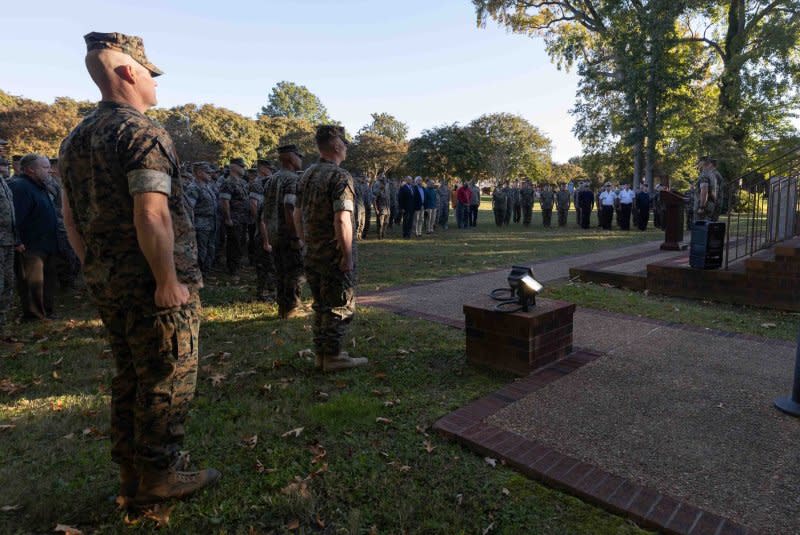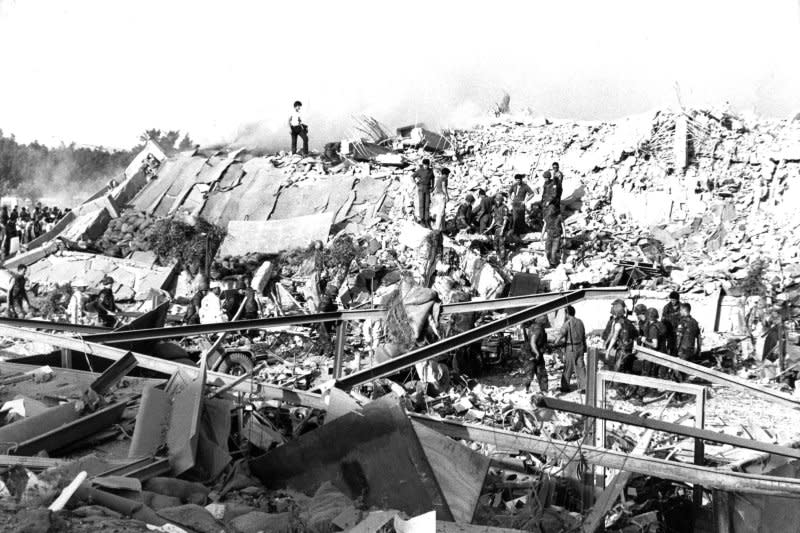As hostilities grow in Lebanon today, U.S. officials remember '83 Beirut attack

Oct. 23 (UPI) -- The U.S. Embassy in Lebanon on Monday commemorated the 40th anniversary of the Oct. 23, 1983, suicide bombing of the U.S. Marine Corps barracks in Beirut, in which 241 U.S. servicemembers died.
The ceremony in Beirut, attended by U.S. Ambassador Dorothy Shea and other officials, came even as a new conflict between Israel and the Lebanon-based Islamic militant group Hezbollah appeared to be quickly escalating.
A similar memorial service was held Monday in at the Naval Support Activity Hampton Roads facility in Virginia, where Capt. Matt Berrens, a chaplain with the U.S. Navy and Marines, and other officials delivered remarks to a group including Marines, sailors and civilians.
The Americans were killed shortly after hundreds of Marines, along with French, British and Italian soldiers, landed in Beirut as part of a multinational peacekeeping force at the approximate midpoint of a 15-year civil war pitting Islamist factions backed by Syria and Iran against forces loyal to Lebanese Christian and Maronite leaders.
The war included interventions by both Syria and Israel, the latter of which invaded Lebanon in June 1982, evicted the Palestinian Liberation Organization from the country and began an occupation in Lebanon's southern areas.

Historians of the era say the occupation of southern Lebanon during this period led to the militarization of Shiite Muslims in the region and the establishment of the Islamic militant group Hezbollah, based in the remote, Syrian-controlled Bekaa Valley, which quickly established close ties to Iran.
Against that backdrop, on Oct. 23, 1983, two suicide truck bombers struck the buildings housing Multinational Force in Lebanon peacekeepers, killing 241 U.S. and 58 French peacekeepers and six civilians.

U.S. investigations and court rulings later determined the bombing was carried out by Hezbollah with the approval and financing of senior Iranian officials. including Iran's supreme leader, Ayatollah Ruhollah Khomeini, and its then-president, Ali Akbar Rafsanjani.
In Monday's commemorative ceremony, Shea remembered the sacrifices of the U.S. peacekeepers who were killed that day.

"We are here, today, 40 years later, to honor the memories of those who came in peace. We remember, and we honor them," she said. "We are also here to say unequivocally that our commitment to the Lebanese people is so much stronger than any cowardly act of violence or terrorism."

The comments came as new violence erupted along the Israeli-Lebanon border. Israeli Defense Forces and Hezbollah militants exchanged fire Monday as Israel's massive military assault targeting Hamas fighters in Gaza threatened to spill over onto a second front.
Israel has been waging a war against Hamas in the Palestinian enclave since Oct 7, when the militant group launched a surprise attack that killed some 1,400 people. More than 5,000 Palestinians, mainly civilians, have died in the retaliatory actions, Hamas officials say.
As fears of widening war spread, Israel evacuated communities along the Lebanese border, expanding the area to include a total 14 communities, as IDF warplanes struck Hezbollah targets inside Lebanon in overnight assaults.
"Today, we reject, and the Lebanese people reject, the threats of some to drag Lebanon into a new war," Shea said Monday.
"We continue to renounce any attempts to shape the region's future through intimidation, violence, and terrorism -- and here I am talking about not just Iran and Hezbollah, but also Hamas and others, who falsely paint themselves as a noble 'resistance,' and who most certainly do not represent the aspirations -- or the values -- of the Palestinian people, while they try to rob Lebanon and its people of their bright future," she said.

